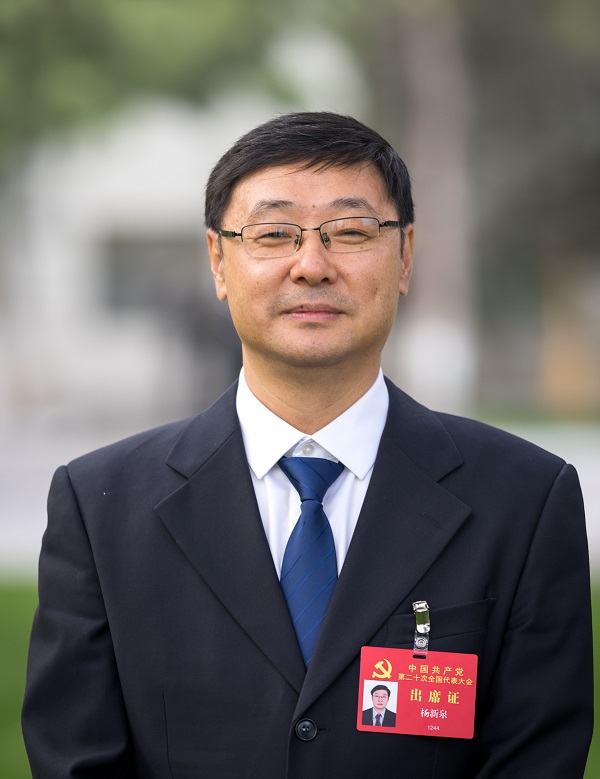
Yang Xinquan
Most agricultural scientists focus on cultivating new seeds and their varieties, while some work hard to create good conditions for scientific and technological research. Yang Xinquan, a delegate to the 20th National Congress of the Communist Party of China, is dedicated to accelerating the development of the Yazhou Bay Seed Laboratory in the Yazhou Bay Science and Technology City in Sanya, Hainan province.
Yang, 50, has been studying agricultural genetics and breeding for more than 20 years. He started to work as a researcher for the laboratory in April 2021, and made an oath at that time — to work hard and promote the vitalization of China's seed industry.
The Yazhou Bay Seed Laboratory was established one month later. So when Yang arrived at the Yazhou Bay Science and Technology City, he was surprised by the barren situation in front of him — everything had to be started from scratch, and the construction of the laboratory building had only just begun. It was short of people, scientific research equipment, offices and even living facilities.
Like many Chinese scientists and researchers, however, Yang was not afraid of tough conditions. He devoted himself to the establishment of the laboratory and overcame many challenges.
To facilitate scientific research, Yang paid much attention to attracting talent, compiling a long list of experts and specialists from the domestic seed industry.
Thanks to his unrelenting efforts, 23 academicians have started to form innovative teams in the laboratory and there are 76 project teams involved in resolving specific research obstacles, and all capable research teams, regardless of their backgrounds, can compete to lead projects.
One year after the laboratory's establishment, Yang founded a laboratory council and formed a closely integrated mechanism involving 23 universities, institutes, enterprises and government departments including the Department of Science and Technology of Hainan province.
Now the laboratory has more than 7,000 pieces of high-tech scientific research equipment including seed quality classification machines. Modern innovation platforms have led to seed precision design breeding. "The laboratory is doing its best to create better scientific study conditions for researchers," said Yang.
In northern China, after autumn harvests, it is difficult to carry out crop breeding work. In order not to waste half a year's research time, during winter and spring every year, a large number of breeding scientists move to work in Hainan because it has good light and temperature conditions.
So far, tens of thousands of scientists and technicians from 29 provincial-level regions have come to Hainan to conduct breeding work, and more than 20,000 new varieties of major crops have been multiplied and bred on the tropical island, accounting for more than 70 percent of the new varieties bred in the country, according to Yang.
He believes that the establishment of the Yazhou Bay Seed Laboratory not only provides a great scientific research platform for agricultural scientists from all over the country, but has also united various seed study organizations to undertake joint research.
In April, when President Xi Jinping visited the laboratory, he pointed out that if the Chinese people want to hold their rice bowl tight in their hands, they must develop the seed industry on their own.
The report of the 20th National Congress of the Communist Party of China mentioned "food security "twice. After the congress, Yang, as a delegate, urged for more efforts to focus on realizing self-reliance in seed science and technology, and making sure that the sources of seeds are under domestic control.
"The seed industry is the lifeline of modern agricultural development and the cornerstone of ensuring food security," Yang said.
"We'll strive to build the Yazhou Bay Seed Laboratory into a hub of innovation in the seed industry and hopefully it will provide Chinese solutions to the world's food security issues."
Currently, the laboratory is strengthening the construction of multidisciplinary platforms, accelerating the speed of talent introduction, striving to undertake national tasks related to the seed industry, and making every effort to improve the efficiency and quality of scientific research.
Yazhou Bay Seed Laboratory is in the process of breeding 15 new varieties of melons and vegetables, and exploring the introduction of hightemperature-resistant varieties for summer.